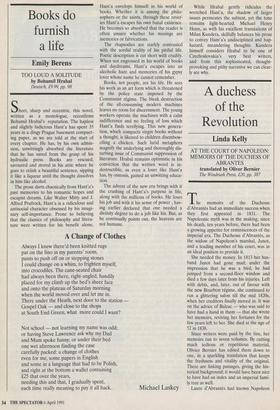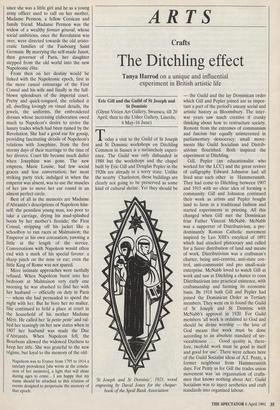A duchess of the Revolution
Linda Kelly
AT THE COURT OF NAPOLEON: MEMOIRS OF THE DUCHESS OF ABRANTES translated by Oliver Bernier The Windrush Press, f20, pp. 387 The memoirs of the Duchesse d'Abrantes had an immediate success when they first appeared in 1831. The Napoleonic myth was in the making; since his death, ten years before, there had been a growing appetite for reminiscences of the imperial era. The Duchesse d'Abrantes, as the widow of Napoleon's marshal, Junot, and a leading member of his court, was in an ideal position to provide it.
She needed the money. In 1813 her hus- band Junot had gone mad; under the impression that he was a bird, he had jumped from a second-floor window and died a few days later from his injuries. Left with debts, and, later, out of favour with the new Bourbon regime, she continued to run a glittering salon till the mid 1820s, when her creditors finally moved in. It was on the advice of Balzac — who was said to have had a hand in them — that she wrote her memoirs, reviving her fortunes for the few years left to her. She died at the age of 52 in 1838.
Since writers were paid by the line, her memoirs ran to seven volumes. By cutting much tedious or repetitious material, Olivier Bernier has edited them down to one, in a sparkling translation that keeps the freshness and vitality of the original. There are linking passages, giving the his- torical background; it would have been nice to have had an index and an imperial fami- ly tree as well.
Laure d'Abrantes had known Napoleon since she was a little.girl and he as a young army officer used to call on her mother, Madame Permon, a fellow Corsican and family friend. Madame Permon was the widow of a wealthy fermier general, whose social ambitions, once the Revolution was over, were directed towards the old aristo- cratic families of the Faubourg Saint Germain. By marrying the self-made Junot, then governor of Paris, her daughter stepped from the old world into the new Napoleonic elite.
From then on her destiny would be linked with the Napoleonic epoch, first in the more casual entourage of the First Consul and his wife and finally in the full- blown splendours of the imperial court. Pretty and quick-tongued, she relished it all, dwelling lovingly on visual details, the jewels, the uniforms, the embroidered dresses whose increasing elaboration owed much to Napoleon's desire to revive the luxury trades which had been ruined by the Revolution. She had a good ear for gossip, providing fascinating details of Napoleon's relations with Josephine, from the first stormy days of their marriage to the time of her divorce. Court life became much duller when Josephine was gone. The new empress, Marie Louise, had few social graces and less conversation; her most striking party trick, indulged in when the emperor was absent, was to use the muscles of her jaw to move her ear round in an almost perfect circle.
Best of all in the memoirs are Madame d'Abrantes's descriptions of Napoleon him- self: the penniless young man, too poor to take a carriage, drying his mud-splashed boots by her mother's fireside; the First Consul, stripping off his jacket like a schoolboy to run races at Malmaison; the Emperor at his own coronation, yawning a little at the length of the service. Conversations with Napoleon would often end with a mark of his special favour: a sharp pinch on the nose or ear; even the little King of Rome was not spared.
More intimate approaches were tactfully refused. When Napoleon burst into her bedroom at Malmaison very early one morning he was abashed to find her with her husband — officially on duty in Paris — whom she had persuaded to spend the night with her. But he bore her no malice. She continued to hold a place at court in the household of his mother Madame Mere. He called her la petite peste' and ral- lied her teasingly on her new status when in 1807 her husband was made the Duc d'Abrantes. When Napoleon fell, the Bourbons allowed the widowed Duchess to keep her title. She was grateful to the new regime, but loyal to the memory of the old:
Napoleon was to France from 1795 to 1814 a tutelary providence [she wrote at the conclu- sion of her memoirs], a light that will shine during ages to come... I am happy that my name should be attached to this relation of events designed to perpetuate the memory of that epoch.



















































 Previous page
Previous page